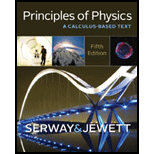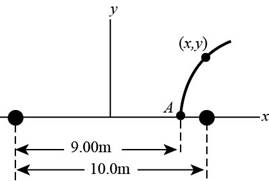
Concept explainers
(a)
To show: The receiver at point A records a minimum in sound intensity from the two speakers.
(a)
Answer to Problem 12P
Therefore, the receiver at point A records the minimum sound intensity because of destructive interference.
Explanation of Solution
Given information: The speed of the sound is 344 m/s, frequency generated by the loudspeakers is 21.5 Hz and the distance between two speakers is 10.0 m.
The given figure of two loudspeakers is shown below.

Figure (I)
From Figure (I), the distance from the first speaker to A is 9 m.
The distance from the second speaker to B is given as,
10 m−9 m=1 m
Formula to calculate the path difference for minimum intensity is,
d1−d2=λ2 (I)
- d1 is the distance from the first speaker to A.
- d2 is the distance from the second speaker to B.
Substitute vf for λ in equation (I).
d1−d2=vf2 (II)
- λ is the wavelength of each wave.
- v is the velocity of the sound.
- f is the frequency generated by the loudspeakers.
Substitute 344 m/s for v, 21.5 Hz for f, 1 m for d2 and 9 m for d1 in equation (II).
9 m−1 m=344 m/s21.5 Hz28 m=8 m
The difference between distance d1 and d2 of loudspeaker from point A is same as the half of the wavelength. Hence, this is condition for the destructive interference. So, the receiver at point A records a minimum intensity.
Conclusion:
Therefore, the receiver at point A records the minimum sound intensity because of destructive interference.
(b)
To show: The path it should take so that the intensity remains at a minimum is along the given hyperbola equation.
(b)
Answer to Problem 12P
Therefore, the path takes by the receiver is along the hyperbola whose equation is given as, 9x2−16y2=144.
Explanation of Solution
Given information: The speed of the sound is 344 m/s, frequency generated by the loudspeakers is , the distance between two speakers is 10 m.
Formula to calculate the wavelength of each wave is,
λ=vf
Substitute 344 m/s for v and 21.5 Hz for f.
λ=344 m/s21.5 Hz=16 m
Thus, the wavelength of the each wave is 16 m.
From figure (I), the coordinates for left side speaker is (−5,0) and for the right side speaker is (5,0).
Formula to calculate the path difference for minimum intensity is,
d1−d2=λ2 (III)
The distance for left side speaker at point (−5,0) is,
d1=√(x+5)2+y2
The distance for the right side speaker at point (5,0) is,
d2=√(x−5)2+y2
Substitute √(x+5)2+y2 for d1 and √(x−5)2+y2 for d2 in equation (III).
√(x+5)2+y2−√(x+5)2+y2=λ2√(x+5)2+y2=λ2+√(x+5)2+y2 (IV)
Square on the both sides of the equation (IV),
(√(x+5)2+y2)2=(λ2+√(x+5)2+y2)220x−λ24=λ√(x−5)2+y2 (V)
Square on the both sides of the equation (V),
(20x−λ24)2=(λ√(x−5)2+y2)2400x2+λ416−10xλ=λ2((x−5)2+y2) (VI)
Substitute 16 m for λ in equation (VI).
400x2+(16 m)416−10x×16 m=(16 m)2((x−5)2+y2)9x2−16y2=144
Conclusion:
Therefore, the path takes by the receiver is along the hyperbola whose equation is given as, 9x2−16y2=144.
(c)
To explain:Whether the receiver remains at a minimum and move very far away from the two sources.
(c)
Answer to Problem 12P
Therefore, the receiver remains at a minimum and move very far away from the two sources and the limiting form of the path is two straight lines through the origin with slope ±34.
Explanation of Solution
Given information: The speed of the sound is 344 m/s, frequency generated by the loudspeakers is 21.5 Hz and the distance between two speakers is 10 m.
The equation of the hyperbola is given as,
9x2−16y2=144
Rearrange the above equation for y,
y=±34x√1−16x2
For very large value of x,
y=±34x
It means the receiver remains at a minimum and move very far away from the two sources and the limiting form of the path is two straight lines through the origin with slope ±34.
Conclusion:Therefore, the receiver remains at a minimum and move very far away from the two sources and the limiting form of the path is two straight lines through the origin with slope ±34.
Want to see more full solutions like this?
Chapter 14 Solutions
Principles of Physics: A Calculus-Based Text
- RT = 4.7E-30 18V IT = 2.3E-3A+ 12 38Ω ли 56Ω ли r5 27Ω ли r3 28Ω r4 > 75Ω r6 600 0.343V 75.8A Now figure out how much current in going through the r4 resistor. |4 = unit And then use that current to find the voltage drop across the r resistor. V4 = unitarrow_forward7 Find the volume inside the cone z² = x²+y², above the (x, y) plane, and between the spheres x²+y²+z² = 1 and x² + y²+z² = 4. Hint: use spherical polar coordinates.arrow_forwardганм Two long, straight wires are oriented perpendicular to the page, as shown in the figure(Figure 1). The current in one wire is I₁ = 3.0 A, pointing into the page, and the current in the other wire is 12 4.0 A, pointing out of the page. = Find the magnitude and direction of the net magnetic field at point P. Express your answer using two significant figures. VO ΜΕ ΑΣΦ ? Figure P 5.0 cm 5.0 cm ₁ = 3.0 A 12 = 4.0 A B: μΤ You have already submitted this answer. Enter a new answer. No credit lost. Try again. Submit Previous Answers Request Answer 1 of 1 Part B X Express your answer using two significant figures. ΜΕ ΑΣΦ 0 = 0 ? below the dashed line to the right P You have already submitted this answer. Enter a new answer. No credit lost. Try again.arrow_forward
 Principles of Physics: A Calculus-Based TextPhysicsISBN:9781133104261Author:Raymond A. Serway, John W. JewettPublisher:Cengage Learning
Principles of Physics: A Calculus-Based TextPhysicsISBN:9781133104261Author:Raymond A. Serway, John W. JewettPublisher:Cengage Learning Physics for Scientists and Engineers: Foundations...PhysicsISBN:9781133939146Author:Katz, Debora M.Publisher:Cengage Learning
Physics for Scientists and Engineers: Foundations...PhysicsISBN:9781133939146Author:Katz, Debora M.Publisher:Cengage Learning Physics for Scientists and EngineersPhysicsISBN:9781337553278Author:Raymond A. Serway, John W. JewettPublisher:Cengage Learning
Physics for Scientists and EngineersPhysicsISBN:9781337553278Author:Raymond A. Serway, John W. JewettPublisher:Cengage Learning Physics for Scientists and Engineers with Modern ...PhysicsISBN:9781337553292Author:Raymond A. Serway, John W. JewettPublisher:Cengage Learning
Physics for Scientists and Engineers with Modern ...PhysicsISBN:9781337553292Author:Raymond A. Serway, John W. JewettPublisher:Cengage Learning Physics for Scientists and Engineers, Technology ...PhysicsISBN:9781305116399Author:Raymond A. Serway, John W. JewettPublisher:Cengage Learning
Physics for Scientists and Engineers, Technology ...PhysicsISBN:9781305116399Author:Raymond A. Serway, John W. JewettPublisher:Cengage Learning Glencoe Physics: Principles and Problems, Student...PhysicsISBN:9780078807213Author:Paul W. ZitzewitzPublisher:Glencoe/McGraw-Hill
Glencoe Physics: Principles and Problems, Student...PhysicsISBN:9780078807213Author:Paul W. ZitzewitzPublisher:Glencoe/McGraw-Hill





